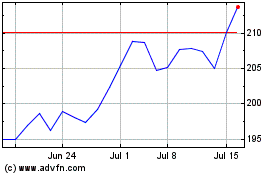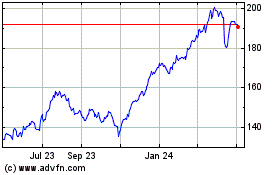JPMorgan Profit Soars After Bank Releases Reserves for Bad Loans -- 3rd Update
April 14 2021 - 10:48AM
Dow Jones News
By Orla McCaffrey
JPMorgan Chase & Co. posted a nearly fivefold increase in
quarterly profit thanks to booming markets and an economic recovery
that allowed it to free up $5.2 billion in funds it had set aside
to cover soured loans.
The nation's largest bank reported a record quarterly profit of
$14.3 billion, or $4.50 per share, well above the $3.10 per share
forecast by analysts polled by FactSet. A year earlier, JPMorgan
reported a quarterly profit of $2.87 billion, or $0.78 a share. The
bank reported revenue of $32.27 billion, up 14% from a year
earlier.
After the coronavirus pandemic took hold in the U.S. early last
year, JPMorgan and other big banks set aside billions of dollars in
loan-loss reserves to prepare for a potential flood of consumer and
business defaults. The rainy-day funds ate into quarterly profits
for much of 2020. But big losses never materialized, and now banks
are now cashing in on their diligence.
Wall Street also powered JPMorgan's first-quarter results.
Corporate and investment bank profit nearly tripled to $5.74
billion, a quarterly record, and revenue rose 46% to $14.6 billion.
Trading revenue rose 25% from a year ago, and investment-banking
fees rose 57%.
The U.S. economy's rebound has surpassed banks' internal
forecasts. Banks believe the trillions of dollars in government
stimulus coursing through the economy, coupled with accelerating
vaccine distribution, has insulated consumers and businesses from
the pandemic's worst-case financial scenarios.
"The year has gotten off to a strong start and a robust economic
recovery is under way," Chief Financial Officer Jennifer Piepszak
said on a call with reporters Wednesday morning. "Of course, there
are still risks and uncertainties that lie ahead that we're
preparing for as well as specific issues that we're facing."
In his annual letter to shareholders last week, Chief Executive
Jamie Dimon said he believes the economy is primed for a
"Goldilocks moment" of fast growth and inflation and interest rates
that move slowly upward.
The bank's stock price reflects that shift. Shares of JPMorgan
have risen more than 21% since the beginning of the year. The KBW
Nasdaq Bank Index, which tracks shares of the largest lenders, is
up close to 25% this year, compared with 10% for the S&P
500.
The forces that pushed JPMorgan's Wall Street operation to its
best fourth quarter on record last year continued into the early
months of 2021. Record investments in blank-check firms helped
boost equity-underwriting fees. Trillions of dollars in government
stimulus flowed into Americans' checking accounts, and some of it
ended up in the stock market.
The bank made a record $3 billion in investment-banking fees in
the first three months of the year. It expects the strengthening
economy, a busy slate of public offerings and high CEO confidence
to provide a steady pipeline of investment-banking deals, Chief
Operating Officer Daniel Pinto said in a memo to employees
Wednesday.
Revenue fell 6% in JPMorgan's sprawling consumer business. In
asset and wealth management, revenue rose 20%.
Total loans fell about 4% from a year ago. Large U.S. lenders
saw their loan books shrink in 2020 for the first time in more than
a decade, but banking executives say they expect demand to pick up
later this year as the economy continues to recover.
Still, banks have been squeezed over the past year by low
interest rates, which crimp what they can make on lending. The
difference between what JPMorgan earns on loans and pays for
deposits fell to 1.69% in the first quarter, down from 2.37% a year
ago.
Deposits surged another 6 percent from the previous quarter, to
$2.28 trillion.
Write to Orla McCaffrey at orla.mccaffrey@wsj.com
(END) Dow Jones Newswires
April 14, 2021 10:33 ET (14:33 GMT)
Copyright (c) 2021 Dow Jones & Company, Inc.
JP Morgan Chase (NYSE:JPM)
Historical Stock Chart
From Aug 2024 to Sep 2024

JP Morgan Chase (NYSE:JPM)
Historical Stock Chart
From Sep 2023 to Sep 2024
